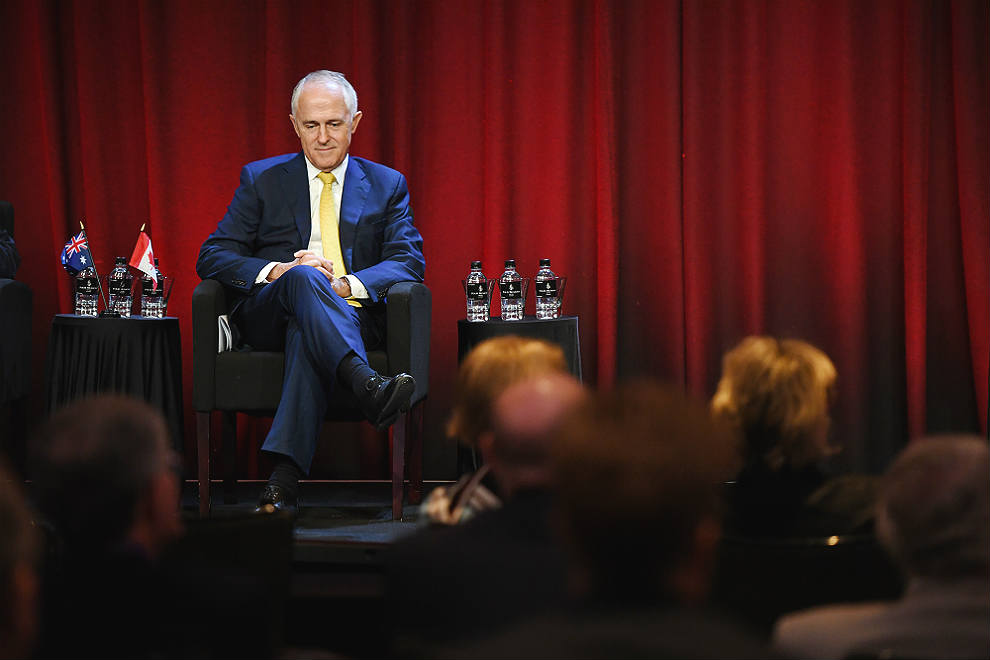Malcolm Turnbull’s position is terminal. He won’t be prime minister by the next election. Last fortnight’s much-reviewed excoriation of opposition leader Bill Shorten during question time all but sealed his demise. It wasn’t the content of that tirade that did it, rather the fact that he felt the need to put on such a show.
That explosion was first and foremost a symptom of the prime minister’s insecure standing among Liberal MPs. It was triggered by a Newspoll showing the government trailing Labor by eight points in voting intentions, the latest in a long line of bad polls.
Tony Abbott and Julia Gillard illustrated how a weak grip on the leadership can drive increasingly desperate behaviour designed to appeal to that tiny portion of Australians known as the party base. All it really does is further repel the bulk of voters and hasten the leader’s demise.
But what else is a leader with crumbling parliamentary support to do? Gillard, like Turnbull, toppled an incumbent prime minister. Like Turnbull, she’d been the favourite of supporters of the other side of politics. And she, too, initially pitched to the political centre, or at least her clunky version of it – sport, small words, smiles and keeping out the foreigners.
By the time they tore her down three years later, she had morphed twice – to union puppet and then to what she had studiously avoided during her whole time in parliament: feminist warrior.
Turnbull’s trajectory is even more pitiable. To ingratiate himself with the party room, he’s been reduced to demeaning himself on the issue he once proudly championed, climate change.
The most appropriate precedent for Turnbull’s 8 February 2017 effort is not Gillard’s 2012 misogyny speech – although both were cynical, carefully choreographed exercises dressed up as spontaneous passion – but Paul Keating. Not “I want to do you slowly” (despite that routine’s rallying effects) but an earlier performance, barely two months after he had wrested the leadership from Bob Hawke.
Keating was still detested and distrusted by much of caucus’s left, who had overwhelmingly supported Hawke. In late February 1992, he launched a parliamentary demolition job on the Coalition’s supposed forelock-tugging to the mother country and Britain’s alleged desertion of Singapore and Malaya during the second world war. Coalition fury was matched by the rage on London’s Fleet Street, Australian historians debated the pros and cons, and, probably most importantly, the Labor faithful were enthused.
But it took the surprise election result a year later – not just a victory but an increased majority – to cement Keating’s place in true believers’ hearts. If Turnbull had managed a decent win last year, it would have heightened his stature among Liberals in the same way. Instead, he scraped home.
Perceived electoral prowess is the ultimate driver of internal authority, and since the election the opinion polls have steadily gone south. Malcolm is past the point of no return. No amount of sucking up to the right wing of the party will rescue him. They will never trust him.
Only one thing can save him, or postpone his demise, and that’s the polls, particularly the most-watched of them all, Newspoll. If the next instalment’s two-party-preferred estimate, rounded to the nearest integer, records an improvement on 46–54, many will see it through the lens of the new, aggressive Malcolm.
But he’ll surely be gone by the end of the year, regardless, which throws up two intriguing questions. The first is: who will replace him? Beyond hardcore Coalition supporters, Tony Abbott remains too toxic. Julie Bishop would be the general public’s choice, but they don’t get a vote. It will presumably need to be a right-winger – they’re the ones demanding blood – which most likely means Peter Dutton or Scott Morrison. Or perhaps Greg Hunt, who ostentatiously sold his soul on climate change long before it was fashionable.
The second question is: how long will Turnbull’s replacement last? With no election due for over two years, and each of these candidates already playing to the base (for a recent exhibit, see the treasurer’s excruciatingly juvenile coal stunt in parliament), we can anticipate further deterioration. Then, perhaps, the pendulum returns to the centre, and Bishop emerges. A lesser question is whether Turnbull will overtake Abbott’s time in office (three days shy of two years). For that he needs to cling on until September.
That’s a lot of Newspolls away. •





